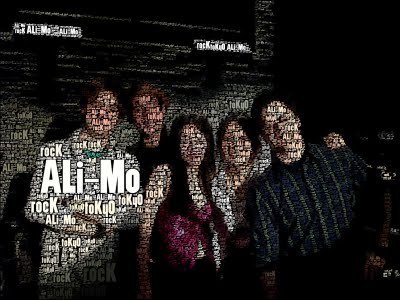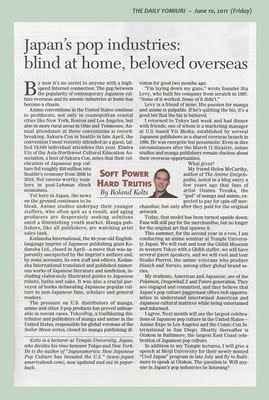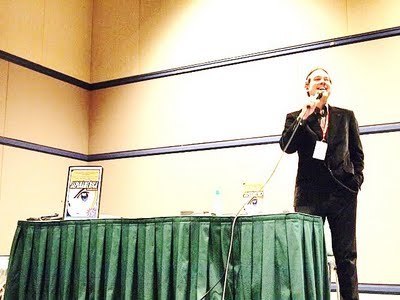Roland Kelts's Blog, page 70
July 7, 2011
ALI-MO resurrected, July 15.
JULY 15th, FRIDAY.
@Crawfish Akasaka
Date: July 15th, Friday
Venue: CRAWFISH Akasaka
http://crawfish.jp/ (03-3584-2496)
Social Akasaka BF 3-11-7 Akasaka
Minato-ku, Tokyo JAPAN 107-0052
Price: FREE!!
ALi-MO Music from 9:00-ish p.m. (or possibly earlier...) untill Midnight-ish
-- another awesome acoustic band may be opening before ALi-MO... TBA.
Guest musician -- Michiko "Maysico" Kawaguchi on SAXOPHONE!
http://silver.ap.teacup.com/areia/
Ali-Mo Website:
http://ali-mo.blogspot.com/
LIKE us on Facebook!
http://www.facebook.com/pages/ALi-MO/40416569651?ref=share
*************************
(Japanese text below)
7月15日, 金曜日 -- 満月の夜。
ALi-MO ライブ@Crawfish Akasaka
日時:7月15日(金)
会場:CRAWFISH 赤坂
http://crawfish.jp/ (03-3584-2496)
〒107-0052
東京都港区赤坂3-11-7 ソシアル赤坂地下
入場料:無料。
ALi-MO演奏: 9:00 p.m.くらい〜真夜中頃まで。
オープニングにはもしかして別のアコースティック・ユニットが
演奏するかも。
ゲスト:Michiko "Maysico" Kawaguchi on Saxophone。
http://silver.ap.teacup.com/areia/
ALi-MO blog:
http://ali-mo.blogspot.com/
find us on facebook, become a 'fan' --
http://www.facebook.com/pages/ALi-MO/40416569651?ref=share
Monkey Business in this month's SWITCH mag, JP
Volume 2 and 2012 events in NYC forthcoming shortly.
[click pic to enlarge]
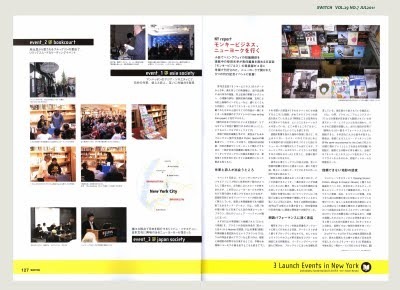
July 6, 2011
Japan in NYC: Robots, Cosplay, Karaoke, Goth-Loli
Pluralism with peace:
June 30, 2011
Monkey rolls: Tokyo launch, new reviews
Tower Books in Shibuya hosted founding editors, translators and scholars Motoyuki Shibata and Ted Goossen for their introduction to the publication, readings, Q&As and photo-ops with the SRO audience.
A book-signing followed, as did an intimate and much quieter dinner conversation among the principals.
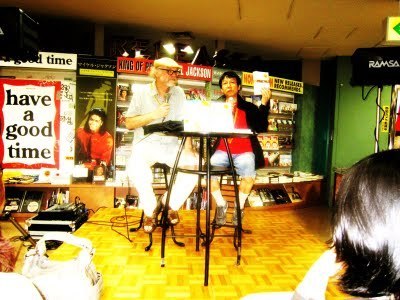 [Goossen and Shibata have a good time]
[Goossen and Shibata have a good time]Monkey Business is now available in Japan at Tower Books, Tsutaya, Kinokuniya and other bookstores specializing in literature and global culture. Twenty-five percent of all sales benefit The Nippon Foundation/CANPAN Northeastern Japan Earthquake and Tsunami Relief Fund.
Our launch events in Canada will take place in Toronto early this fall. Details TBA.
Meanwhile, Volume 2 is well underway, and as of this writing, nearly completed. It promises to be longer and thicker, so to speak, than its virgin predecessor, whose diverse suitors nevertheless continue to issue praise:
"There is no doubt that this endeavor will bring in new audiences for the amazing talent emerging from Japan." Chopsticks NY
"A primary reason to collect literature in translation is to provide a window to different perspectives. Monkey Business is a good choice for collections of contemporary literature." Library Journal
"I love that manga, short fiction, poetry, and interviews can all take their place next to one another... I would not hesitate to recommend Monkey Business to anyone interested in contemporary and experimental Japanese literature." Experiments in Manga
"A strangely fascinating look into the innovative writing that is currently coming out of Japan ... [with] a wonderful interview of Japanese novelist Haruki Murukami [and] a wide selection of material in which we can indulge." iSugoi
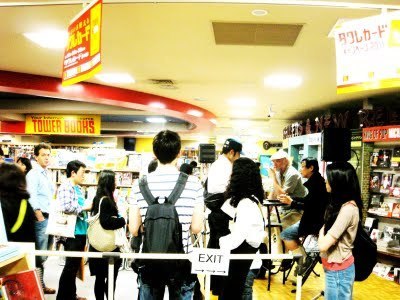 [Monkey receiving line]
[Monkey receiving line]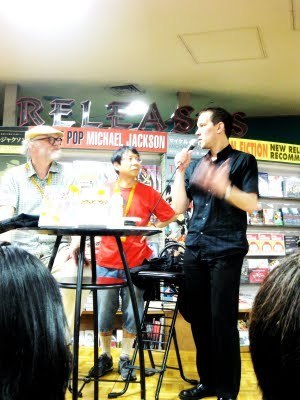 [NYC-Tokyo jet lag jitters]
[NYC-Tokyo jet lag jitters]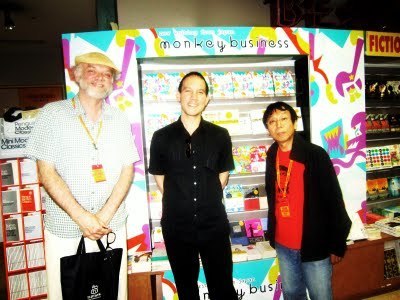 [...and Monkey makes three]
[...and Monkey makes three]*thanks to Rie Muto, Lisa Kato and Yuko Matsukawa.
June 26, 2011
Home, wherever you are
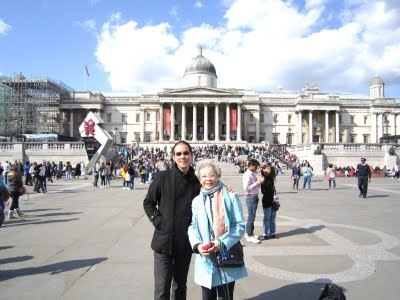
Coming Home to London
I was looking for a light blue raincoat. The bulbs were dim and the ceilings low. At Heathrow Airport's Passport Control Center, the line of my fellow arrivals amassed in clumps, passengers slouching and scratching away the hours of cramped flight, fingering their cell phones and sleepily eyeing watches. There were browns, blues and starched whites—sweaters, jerseys, overcoats and t-shirts. But no light blues. Not a raincoat in sight.
I had landed in London from New York with a singular mission: to escort my Japanese mother around town for a little over a week. My mother, Kaori Saeki, travels a lot, but as a Spanish-language specialist and linguist, and as a Japanese with relatives in her homeland, most of her recent travel has been to Spanish- or Latin-speaking countries like Ecuador, Mexico, Italy, and of course, Spain, or to her homeland archipelago in Asia, Japan. She hadn't been to London in nearly forty years.
But for me, London is like a third home, hovering just behind New York and Tokyo. It was the first city I inhabited as a young adult, when I studied theater, literature and anthropology as a college student, living in a shared flat in Willesden Green, north London, and indulging my Anglophilia. I now have several friends and professional contacts in the city, and I return to London whenever I can.
But this time, I was nursing an Achilles heel: I needed to meet and take care of my mother.
Kaori is now into her early seventies. She is spirited and energetic, genki, but no longer invulnerable in the way we children fantasize our parents to be until we realize that toughness involves responsibility. For many years, I needed her more than she needed me. That equation is now reversing.
We were supposed to meet in London last year, when it became apparent that my father's health was ill-suited to global travel. He had a minor stroke and was diagnosed with an aneurysm and arthritic knees. My mother and I were concocting our London plans when a volcano in Iceland sent ashes over Europe's airports and scuttled any reasonable strategies for European travel.
This year, of course, the natural disaster of the moment hit Japan on March 11—too far from London to affect our itinerary, too early to hinder our April plans.
So we flew—Mom from Boston's Logan Airport, nearest our family home, and me from New York's JFK. I had several jobs lined up in the US in March and April, taking me from Oregon to LA to Baltimore, DC, Boston and NYC.
The only way to coordinate our visit to London was to have each of us depart at roughly the same time from Boston and New York, and meet in London at Heathrow airport.
Mom made the bookings. My job was to catch the flight on time in the wee hours.
Unless you're taking your kids on vacation or engaging in a charter tour, travel is largely a solitary enterprise. It can be a welcome relief, respite from communal duties in offices, classrooms and households, a stretch of time unburdened by conversation or distraction. Most of us can ill-afford monastic lifestyles, temporally or fiscally. Travel often imposes such luxuries.
Yet despite the solace of the seven-hour flight from JFK to Heathrow, I was agitated from the start of this journey. Usually my responsibilities are limited to my own goals—meet the local vendor and hop in a private car to my hotel, or navigate the journey on my own, with a little spare change for cab or train fare and my ID at the ready for check-in.
But this time, I had to find and take care of an irreplaceable figure in my life: my mother. Transportation and check-in were far from my mind.
There were no blue raincoats at Passport Control and none at the luggage carousel ninety minutes later. I had proposed in an email to my mother that we meet at a bookstore near the British Rail shuttle into London in case of emergency. As I felt the sweat on my brow and neck while retrieving my suitcase, I realized that 'emergency,' a word that seemed benign as I typed it to my mother from my apartment in Tokyo, felt suddenly urgent.
When I emerged on the third floor concourse of shops and cafes, I swiftly pivoted toward a lighted map and located the bookstore, several meters to my right. And then I saw her: a diminutive figure, slightly bent, face turned expectantly toward me, eyes hollow. My mother.
We spent the following days on outings in London, a city that still feels like home to me, radiating memories of my youth with a clarity that almost hurts, like a violent hug of intimacy. Lucky to have locals as pals, I was able to provide my mother with a resident's view of tourist sites, neighborhoods and restaurants that no standard visitor would be able to access. We dined high and low—Beef Wellington at the Savoy, high tea at Harrods, and greasy fish and chips at a local shop in Bayswater. We saw Shakespeare's 'Hamlet' at the National Theatre and caught buskers in Brixton. We brunched in Richmond and strolled the grounds of museums and mansions.
Great cities are characters, suffused with particulars as much as are great people. You don't alter them; they alter you. When you arrive in Tokyo, you are nowhere else but Tokyo, like it or not. New York smells like New York as soon as you step out of your car from the airport. London might have 'malls,' but they are subsumed in London-ness the second they are erected.
I am privileged to travel to these cities and indulge in their unique identities, honored to be a part of our globalized world vis-à-vis technology and money. Not for a minute do I forget that stroke of good fortune. Plenty of people today live on small plots of land and never see the streaks of jet plumes above, let alone imagine boarding the flights themselves.
But along the concourse in Heathrow airport this spring, I was reminded how the simplicity of intimacy trumps all other concerns, however fast we travel and connect in our 21st century. Whatever the sights and sounds and smells of London that I encountered in my reunion with my past, the image that lingers is that of my mother, one hand on her suitcase, eyes quivering expectantly as she sought her son amid the strangers, still and soft in her light blue raincoat.
When I saw her, I was home—wherever we were.
June 23, 2011
Monkey Business and Japanamerica, Roland Kelts in NYC
(Special thanks to Kyle McKeveny, Elizabeth Van Meter and Michael Wolk from Gorgeous Entertainment.)
June 21, 2011
Takashi Murakami's 'Google Doodle' for Summer, 2011

Takashi Murakami brings summer solstice to the Google doodle
Takashi Murakami has become a global superstar since founding the Hiropon Factory collective of young artists in Japan.
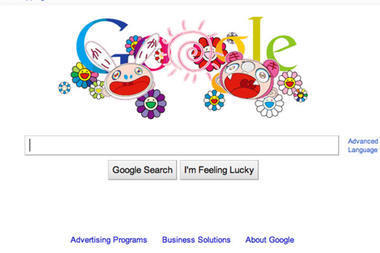
Screenshot of Google.com home page on June 21.
By Roland Kelts, Correspondent / June 21, 2011 TokyoJapanese hipster-turned-multimillionaire artist Takashi Murakami's trademark psychedelic flower faces, narcotized eyes, and menacing mouths have been seen in a lot of places: from MOCA in Los Angeles, the Brooklyn Museum in New York, the Museum of Fine Arts in Boston, and the Guggenheim in Bilbao, Spain, to the sides of Louis Vuitton handbags and the covers of a Kanye West album. Today, they've taken root in cyberspace. Mr. Murakami has contributed the latest so-called Google doodle, a time-specific embellishment of the search engine's corporate logo meant to commemorate a significant occasion – in this case, the official start of summer 2011.
Skip to next paragraph Recent posts 06.21.11Takashi Murakami brings summer solstice to the Google doodle Related stories Japan cracking US pop culture hegemony

